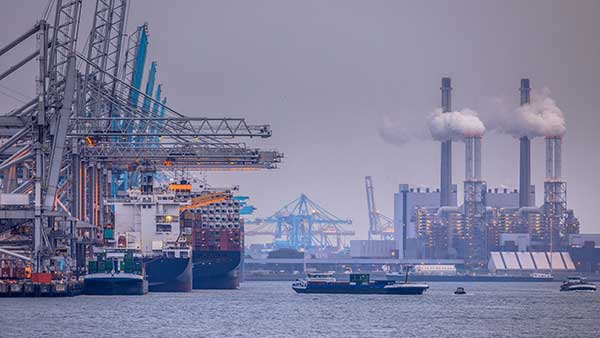The U.S. experienced a shock to its energy supply with the shutdown of Colonial Pipeline, the country’s largest fuel transmission line, after hackers infiltrated the company’s computer network with ransomware and demanded a hefty payment from the company. The question of whether the ransom should be paid evoked considerable debate. Meanwhile, the country made a major advance in its energy transition, as the first large-scale offshore wind project to be established off the coast of Massachusetts was granted federal approval.
Colonial Pipeline’s Decision to Pay Hackers Raises Concerns
Colonial Pipeline is reported to have paid a $5 million ransom to the hackers who disabled their operations with ransomware, sparking debate over the impact such a decision might have.
House Speaker Nancy Pelosi said she was against victims of cyberattacks making such payments, while the White House declined to comment on Colonial Pipeline’s specific issue. Some critics say making such payments to hackers encourages future attacks.
The energy company is believed to have paid the hackers $5 million in untraceable cryptocurrency in return for a decrypting tool that would allow it to regain control of its computer network, though the firm has not confirmed this.
The firm was able to resume operations on Wednesday following the cyberattack that shut down the largest fuel pipeline network in the U.S. for six days and severely disrupted fuel supplies for consumers.
FBI officials have laid the blame for the attack on an Eastern European group of hackers known as DarkSide, though that group has not directly claimed responsibility for the attack.
DarkSide is one of many ransomware gangs that operate from within Russia. Though Russia’s President Vladimir Putin is not believed to be behind the attack on Colonial Pipeline, President Joe Biden has said Putin must accept some responsibility, and he planned on having a conversation with Putin about the matter.
Renewable Energy Capacity Grows 45% in 2020
China was responsible for half of all growth in renewable energy capacity last year, in what is described as the largest growth spurt globally seen since 1999. Worldwide renewable energy capacity grew by 45% in 2020, with 280 gigawatts added.
The International Energy Agency (IEA) said that renewables accounted for 90% of the global power sector’s growth. Government auctions of wind, solar, and bioenergy projects accounted for 75 gigawatts added last year.
Global wind power capacity grew by 90% last year, and solar grew by 23%, the IEA said, predicting that large gains in renewable energy capacity will become the new normal.
The U.S. brought online 19 gigawatts of renewable energy capacity in 2020.
While global coal consumption fell by 4% in 2020, China is expected to bring online considerable additional coal power in 2021, with predictions that its coal consumption will reach record-high levels this year.
The IEA also noted that about 20% of U.S. electricity generation comes from coal-fired plants and 43% comes from natural-gas-fired plants.
The agency is encouraging governments to expand investments in renewable energy to ensure that the targets of the Paris Agreement are achieved.
First Major Offshore Wind Project in U.S. Approved
The first large-scale offshore wind farm in the U.S. has received federal approval to build an 800-megawatt project off the coast of Massachusetts.
Investment in the Vineyard Wind project will be around $3 billion, and 3,600 jobs will be created. The wind project is expected to provide power for 400,000 homes and businesses when construction is completed in 2023.
Whereas onshore wind projects are common in the U.S., the country’s offshore wind sector is relatively underdeveloped and far behind that of Europe’s, where the sector attracted $31 billion in investment last year.
Hence, the Vineyard Wind project is being hailed as a milestone for American energy.
However, representatives of the fishing industry are unhappy with the decision to greenlight the project and fear that it will have an adverse impact on their livelihoods. They said the authorities gave little consideration to the concerns they have expressed about the project.
Netherlands Pledges More Than $2 Billion to Bury Carbon
The Netherlands has granted a $2.4 billion subsidy requested by Royal Dutch Shell and ExxonMobil to fund the building of a carbon capture project at the Port of Rotterdam.
The project would involve carrying emissions from refineries and factories in the port area’s industrial cluster to be buried in empty gas fields in the North Sea and is expected to reduce emissions by 10%.
Shell and Exxon, together with industrial gas suppliers Air Liquide and Air Products, had requested the subsidy to compensate the companies for the extra costs involved in capturing the emissions.
Under the EU emissions trading scheme, the companies would currently pay 53 euros per metric ton of emissions they release. But with the carbon capture project, they will be paying 80 euros per ton of emissions.
The subsidy is meant to make up for that difference, though as prices under the emissions scheme continue to rise, the subsidy may no longer be necessary by 2024 when the project is expected to be up and running.
Elon Musk Says No to Bitcoin
Tesla’s CEO Elon Musk announced on Twitter that he will not be accepting bitcoin as payment for his electric vehicles after all, three months after announcing that his company would accept the cryptocurrency from buyers of his vehicles
Musk claims that he is concerned about the “insane” amount of energy that bitcoin production consumes and the negative impact on the environment.
Earlier this year, Tesla announced it had purchased $1.5 billion in bitcoins, which Musk says it will not sell. Rather, he said, his company would use the bitcoins it purchased as soon as they become more environmentally sustainable.
His tweet led to a 10% drop in the value of bitcoin, which had enjoyed a surge after his endorsement of it in February this year.
Tennessee Shutting Down Old Coal Plants
The Tennessee Valley Authority (TVA) confirmed that it will retire its four remaining coal plants between now and 2035, as it continues to strive for cleaner energy generation.
Currently, only 14% of the utility’s energy production comes from coal since it has continually moved to cleaner forms of energy over the years.
The TVA says the Shawnee plant in Kentucky and the Cumberland, Gallatin, and Kingston plants in Tennessee will be retired. The combined capacity of the plants is more than 6,000 megawatts.
The Cumberland plant released more than 8 million tons of carbon emissions each year and 20 times more mercury into surrounding waterways than any other U.S. coal plant.
Fairfax County Receives Grant to Aid Electric Vehicle Transition
Fairfax County is receiving $4.4 million from the Virginia Clean Air Communities Program that will be used to support green transportation initiatives.
The money will be spent on an electric vehicle pilot, as part of an effort to achieve carbon neutrality in the country’s transportation sector by 2040. The county government wants to convert its fleet of 6,347 vehicles to electric vehicles or non-carbon-emitting vehicles in due course.
The county’s Department of Transportation will use some of the funds to replace four diesel buses with all-electric buses that will be used in a demonstration program over a two-year period. The new buses should reduce the county’s fuel usage by 32,000 gallons annually. Some of the funds will also be used to install charging equipment.
Though the department still has to decide on the exact start date for the electric vehicle pilot project, it hopes to begin in early 2022 at the latest.
Approximately 99% of Virginia’s public school buses run on diesel.
Home Buyers in UAE Get Green Mortgages
Customers buying homes in Dubai’s Sustainable City are benefiting from green mortgages, where the interest rate on the loans is tied to their property’s energy rating. Buyers of properties that are LEED-certified get an interest rate discount of 0.25% on their mortgages and a significant reduction in bank processing fees.
Dubai’s Sustainable City has been designed to be a net-zero energy city.
HSBC said the demand for financing for sustainability projects grew sixfold in 2020 in the Middle East, and it intends to provide as much as $1 trillion in sustainable financing and investment by 2030.
The UAE has plans to cut emissions by 23% over the next decade and considerably increase its use of solar energy and nuclear energy.
Opinion writer: Jewel Fraser
The opinions, beliefs, and viewpoints expressed by the various authors do not necessarily reflect the opinions, beliefs, or viewpoints of Interactive Energy Group, LLC (IEG) or its parent companies or affiliates and may have been created by a third party contracted by IEG. Any content provided by the bloggers or authors are of their opinion and are not intended to malign any individual, organization, company, group, or anyone or anything.
Brought to you by energysavings.com
All images licensed from Adobe Stock.
Featured image:



